Operations Management Strategies for Business Growth: Morrisons Report
VerifiedAdded on 2023/01/12
|12
|3741
|33
Report
AI Summary
This report provides an in-depth analysis of operations management within Morrisons, a major UK supermarket chain. It begins by defining operations management and its support for business aims, specifically focusing on Morrisons' goal of becoming a cost leader and meeting market demands. The report then examines two key operations management approaches employed by Morrisons: Just-In-Time (JIT) inventory management, which aims to reduce waste and inventory costs, and Total Quality Management (TQM), which focuses on continuous improvement and customer satisfaction. Furthermore, the report explores two crucial management approaches that contribute to business growth: Taylor's Scientific Management, outlining its principles, and Fayol's Principles of Management. These approaches are discussed in the context of how Morrisons ensures its business management functions drive company growth and development. The report highlights the importance of these strategies for achieving operational efficiency and maintaining a competitive edge in the retail market.
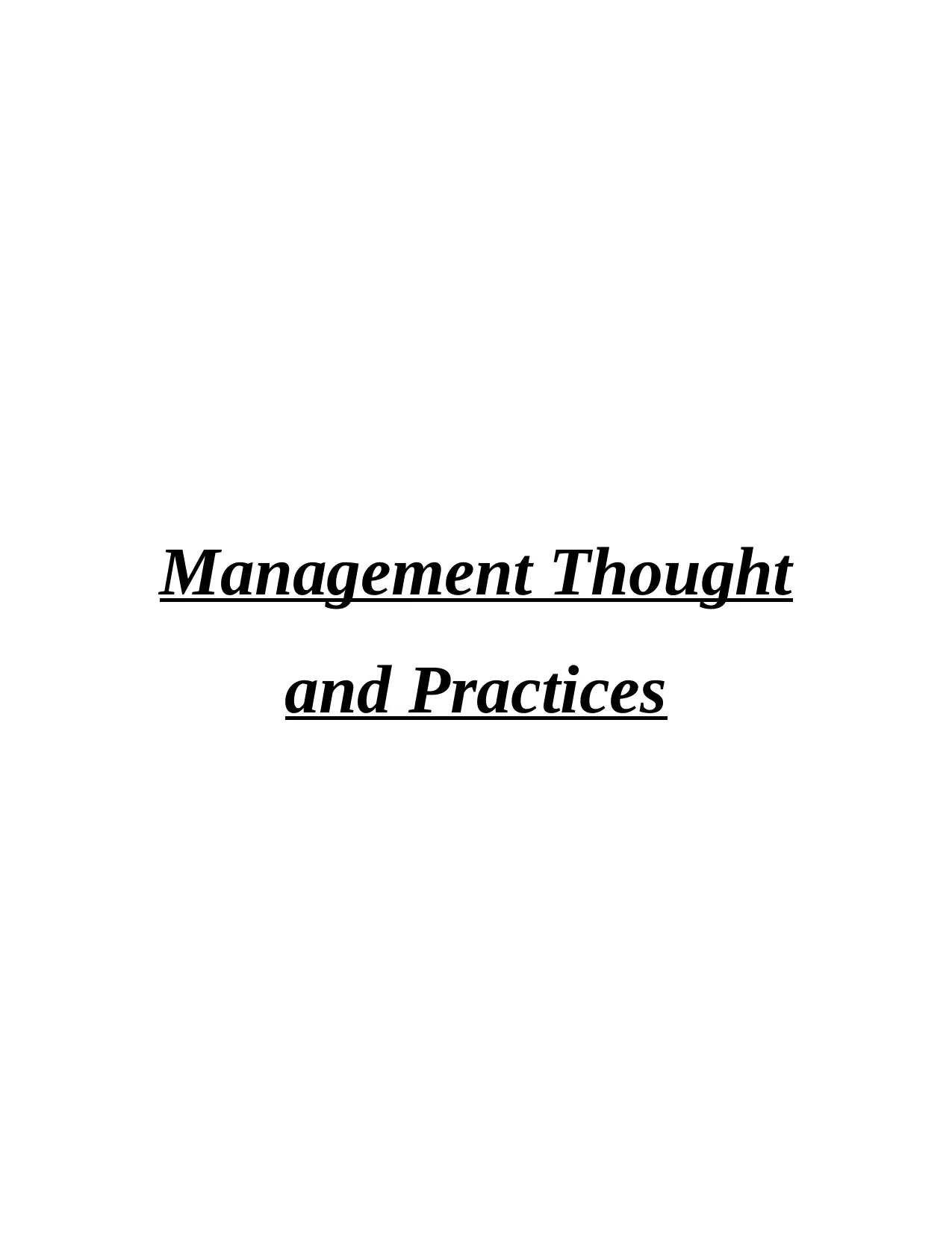
Management Thought
and Practices
and Practices
Paraphrase This Document
Need a fresh take? Get an instant paraphrase of this document with our AI Paraphraser
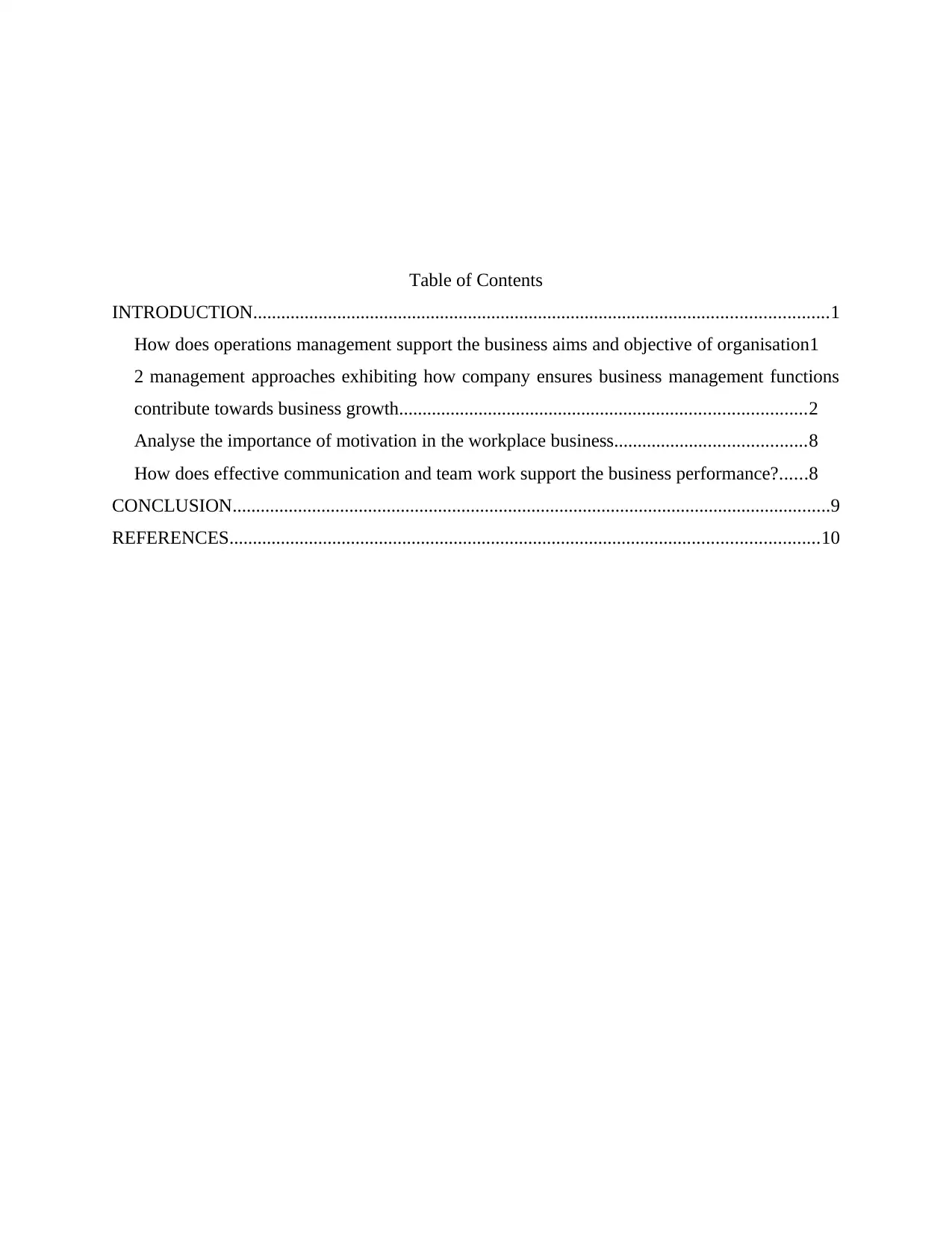
Table of Contents
INTRODUCTION...........................................................................................................................1
How does operations management support the business aims and objective of organisation1
2 management approaches exhibiting how company ensures business management functions
contribute towards business growth.......................................................................................2
Analyse the importance of motivation in the workplace business.........................................8
How does effective communication and team work support the business performance?......8
CONCLUSION................................................................................................................................9
REFERENCES..............................................................................................................................10
INTRODUCTION...........................................................................................................................1
How does operations management support the business aims and objective of organisation1
2 management approaches exhibiting how company ensures business management functions
contribute towards business growth.......................................................................................2
Analyse the importance of motivation in the workplace business.........................................8
How does effective communication and team work support the business performance?......8
CONCLUSION................................................................................................................................9
REFERENCES..............................................................................................................................10
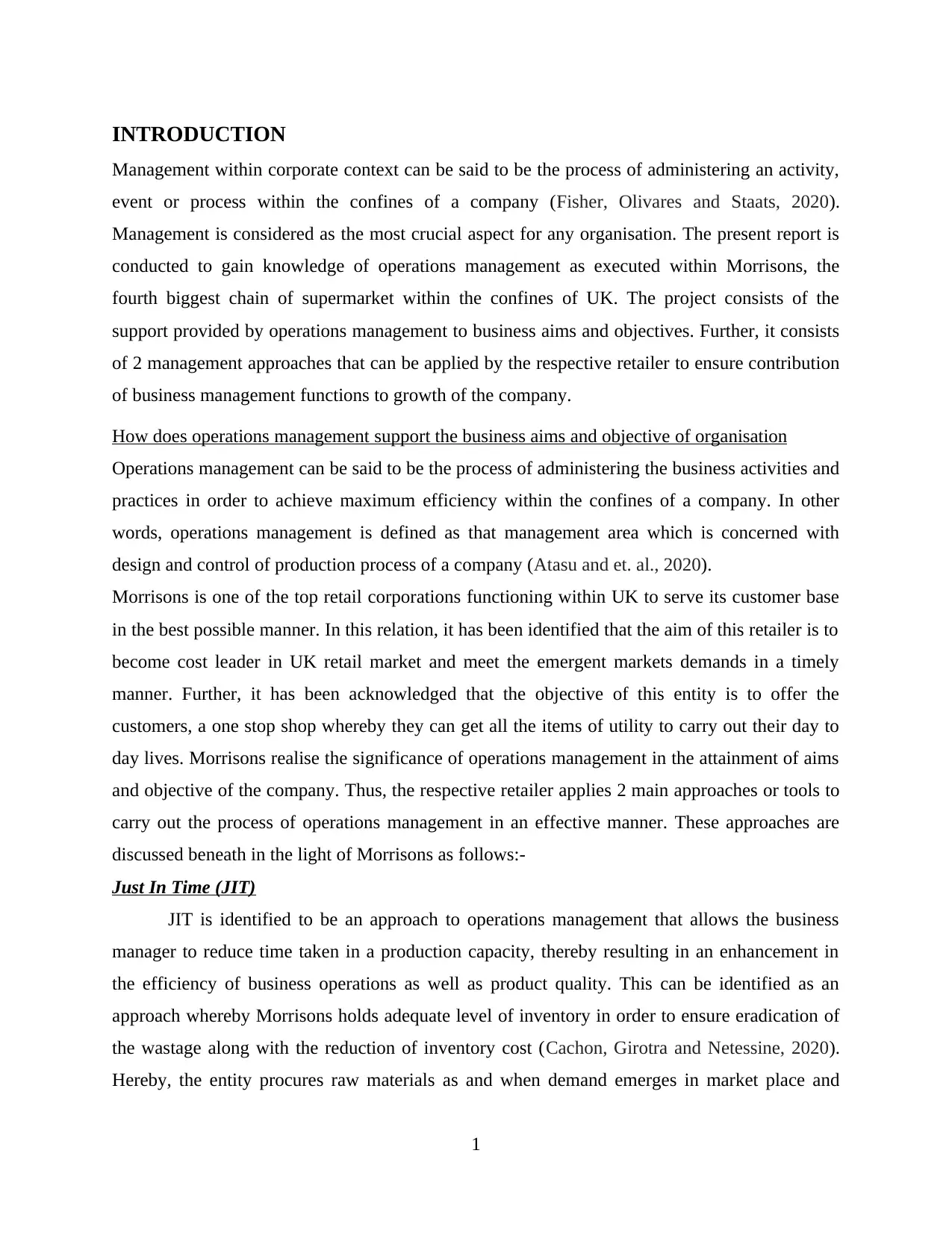
INTRODUCTION
Management within corporate context can be said to be the process of administering an activity,
event or process within the confines of a company (Fisher, Olivares and Staats, 2020).
Management is considered as the most crucial aspect for any organisation. The present report is
conducted to gain knowledge of operations management as executed within Morrisons, the
fourth biggest chain of supermarket within the confines of UK. The project consists of the
support provided by operations management to business aims and objectives. Further, it consists
of 2 management approaches that can be applied by the respective retailer to ensure contribution
of business management functions to growth of the company.
How does operations management support the business aims and objective of organisation
Operations management can be said to be the process of administering the business activities and
practices in order to achieve maximum efficiency within the confines of a company. In other
words, operations management is defined as that management area which is concerned with
design and control of production process of a company (Atasu and et. al., 2020).
Morrisons is one of the top retail corporations functioning within UK to serve its customer base
in the best possible manner. In this relation, it has been identified that the aim of this retailer is to
become cost leader in UK retail market and meet the emergent markets demands in a timely
manner. Further, it has been acknowledged that the objective of this entity is to offer the
customers, a one stop shop whereby they can get all the items of utility to carry out their day to
day lives. Morrisons realise the significance of operations management in the attainment of aims
and objective of the company. Thus, the respective retailer applies 2 main approaches or tools to
carry out the process of operations management in an effective manner. These approaches are
discussed beneath in the light of Morrisons as follows:-
Just In Time (JIT)
JIT is identified to be an approach to operations management that allows the business
manager to reduce time taken in a production capacity, thereby resulting in an enhancement in
the efficiency of business operations as well as product quality. This can be identified as an
approach whereby Morrisons holds adequate level of inventory in order to ensure eradication of
the wastage along with the reduction of inventory cost (Cachon, Girotra and Netessine, 2020).
Hereby, the entity procures raw materials as and when demand emerges in market place and
1
Management within corporate context can be said to be the process of administering an activity,
event or process within the confines of a company (Fisher, Olivares and Staats, 2020).
Management is considered as the most crucial aspect for any organisation. The present report is
conducted to gain knowledge of operations management as executed within Morrisons, the
fourth biggest chain of supermarket within the confines of UK. The project consists of the
support provided by operations management to business aims and objectives. Further, it consists
of 2 management approaches that can be applied by the respective retailer to ensure contribution
of business management functions to growth of the company.
How does operations management support the business aims and objective of organisation
Operations management can be said to be the process of administering the business activities and
practices in order to achieve maximum efficiency within the confines of a company. In other
words, operations management is defined as that management area which is concerned with
design and control of production process of a company (Atasu and et. al., 2020).
Morrisons is one of the top retail corporations functioning within UK to serve its customer base
in the best possible manner. In this relation, it has been identified that the aim of this retailer is to
become cost leader in UK retail market and meet the emergent markets demands in a timely
manner. Further, it has been acknowledged that the objective of this entity is to offer the
customers, a one stop shop whereby they can get all the items of utility to carry out their day to
day lives. Morrisons realise the significance of operations management in the attainment of aims
and objective of the company. Thus, the respective retailer applies 2 main approaches or tools to
carry out the process of operations management in an effective manner. These approaches are
discussed beneath in the light of Morrisons as follows:-
Just In Time (JIT)
JIT is identified to be an approach to operations management that allows the business
manager to reduce time taken in a production capacity, thereby resulting in an enhancement in
the efficiency of business operations as well as product quality. This can be identified as an
approach whereby Morrisons holds adequate level of inventory in order to ensure eradication of
the wastage along with the reduction of inventory cost (Cachon, Girotra and Netessine, 2020).
Hereby, the entity procures raw materials as and when demand emerges in market place and
1
⊘ This is a preview!⊘
Do you want full access?
Subscribe today to unlock all pages.

Trusted by 1+ million students worldwide
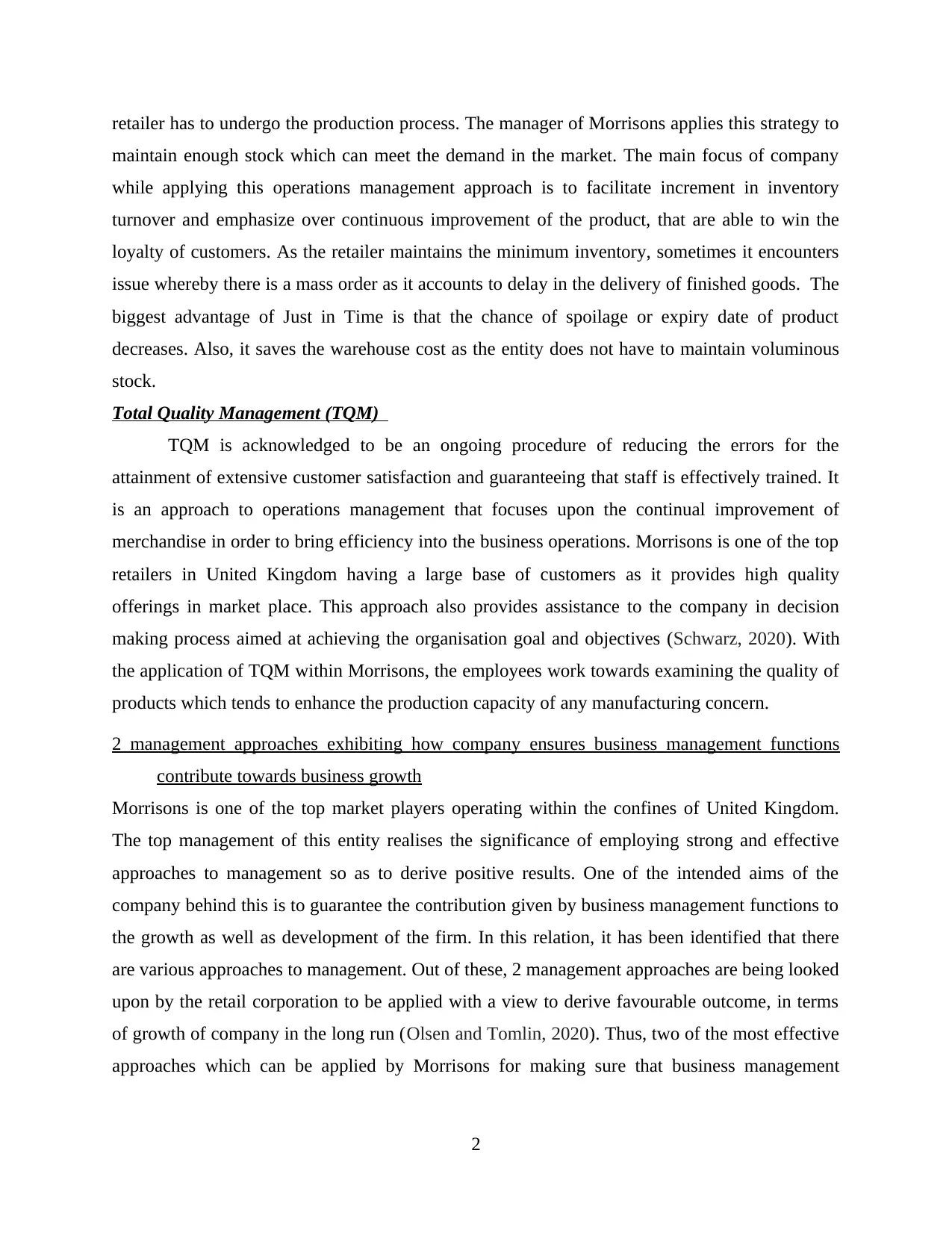
retailer has to undergo the production process. The manager of Morrisons applies this strategy to
maintain enough stock which can meet the demand in the market. The main focus of company
while applying this operations management approach is to facilitate increment in inventory
turnover and emphasize over continuous improvement of the product, that are able to win the
loyalty of customers. As the retailer maintains the minimum inventory, sometimes it encounters
issue whereby there is a mass order as it accounts to delay in the delivery of finished goods. The
biggest advantage of Just in Time is that the chance of spoilage or expiry date of product
decreases. Also, it saves the warehouse cost as the entity does not have to maintain voluminous
stock.
Total Quality Management (TQM)
TQM is acknowledged to be an ongoing procedure of reducing the errors for the
attainment of extensive customer satisfaction and guaranteeing that staff is effectively trained. It
is an approach to operations management that focuses upon the continual improvement of
merchandise in order to bring efficiency into the business operations. Morrisons is one of the top
retailers in United Kingdom having a large base of customers as it provides high quality
offerings in market place. This approach also provides assistance to the company in decision
making process aimed at achieving the organisation goal and objectives (Schwarz, 2020). With
the application of TQM within Morrisons, the employees work towards examining the quality of
products which tends to enhance the production capacity of any manufacturing concern.
2 management approaches exhibiting how company ensures business management functions
contribute towards business growth
Morrisons is one of the top market players operating within the confines of United Kingdom.
The top management of this entity realises the significance of employing strong and effective
approaches to management so as to derive positive results. One of the intended aims of the
company behind this is to guarantee the contribution given by business management functions to
the growth as well as development of the firm. In this relation, it has been identified that there
are various approaches to management. Out of these, 2 management approaches are being looked
upon by the retail corporation to be applied with a view to derive favourable outcome, in terms
of growth of company in the long run (Olsen and Tomlin, 2020). Thus, two of the most effective
approaches which can be applied by Morrisons for making sure that business management
2
maintain enough stock which can meet the demand in the market. The main focus of company
while applying this operations management approach is to facilitate increment in inventory
turnover and emphasize over continuous improvement of the product, that are able to win the
loyalty of customers. As the retailer maintains the minimum inventory, sometimes it encounters
issue whereby there is a mass order as it accounts to delay in the delivery of finished goods. The
biggest advantage of Just in Time is that the chance of spoilage or expiry date of product
decreases. Also, it saves the warehouse cost as the entity does not have to maintain voluminous
stock.
Total Quality Management (TQM)
TQM is acknowledged to be an ongoing procedure of reducing the errors for the
attainment of extensive customer satisfaction and guaranteeing that staff is effectively trained. It
is an approach to operations management that focuses upon the continual improvement of
merchandise in order to bring efficiency into the business operations. Morrisons is one of the top
retailers in United Kingdom having a large base of customers as it provides high quality
offerings in market place. This approach also provides assistance to the company in decision
making process aimed at achieving the organisation goal and objectives (Schwarz, 2020). With
the application of TQM within Morrisons, the employees work towards examining the quality of
products which tends to enhance the production capacity of any manufacturing concern.
2 management approaches exhibiting how company ensures business management functions
contribute towards business growth
Morrisons is one of the top market players operating within the confines of United Kingdom.
The top management of this entity realises the significance of employing strong and effective
approaches to management so as to derive positive results. One of the intended aims of the
company behind this is to guarantee the contribution given by business management functions to
the growth as well as development of the firm. In this relation, it has been identified that there
are various approaches to management. Out of these, 2 management approaches are being looked
upon by the retail corporation to be applied with a view to derive favourable outcome, in terms
of growth of company in the long run (Olsen and Tomlin, 2020). Thus, two of the most effective
approaches which can be applied by Morrisons for making sure that business management
2
Paraphrase This Document
Need a fresh take? Get an instant paraphrase of this document with our AI Paraphraser
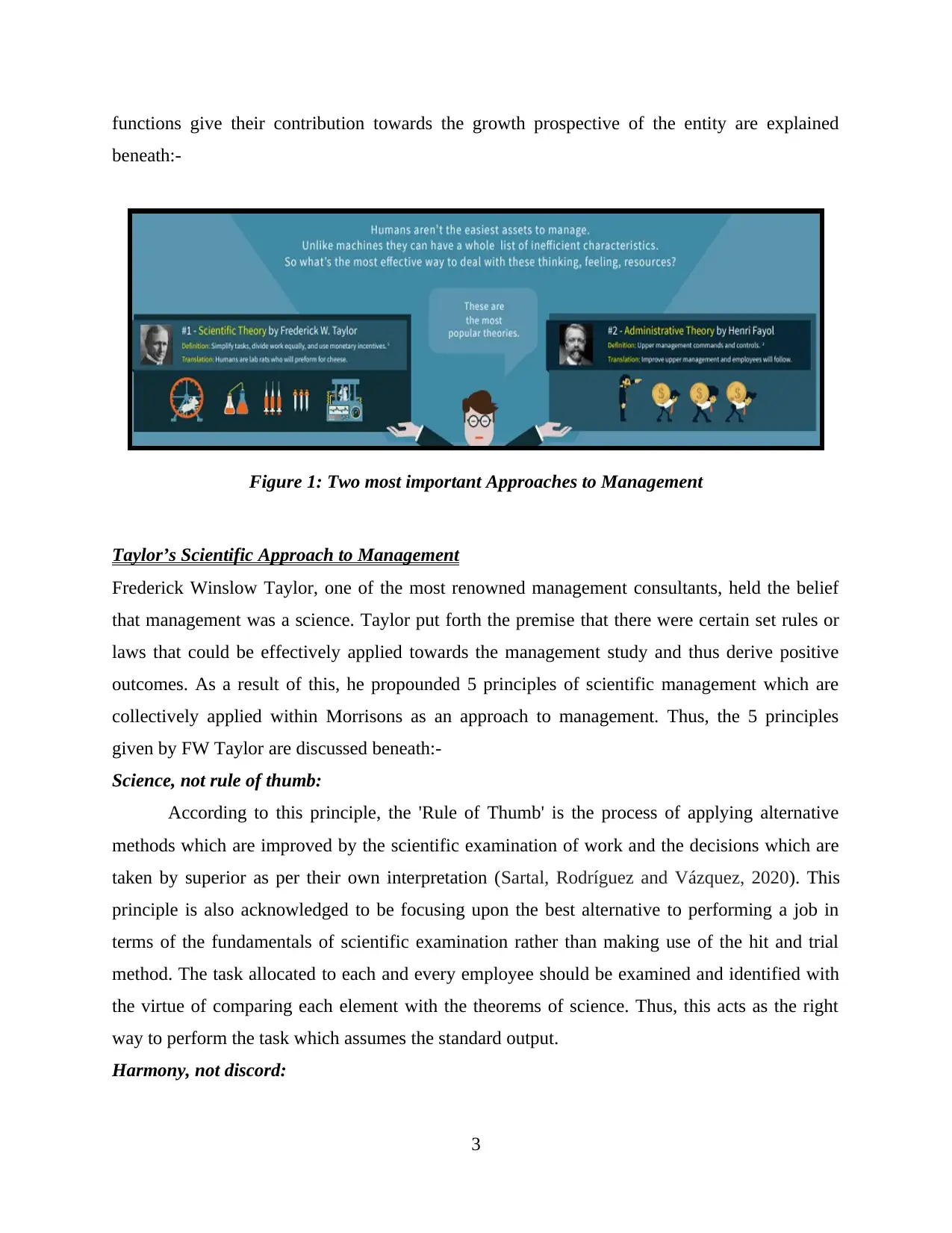
functions give their contribution towards the growth prospective of the entity are explained
beneath:-
Figure 1: Two most important Approaches to Management
Taylor’s Scientific Approach to Management
Frederick Winslow Taylor, one of the most renowned management consultants, held the belief
that management was a science. Taylor put forth the premise that there were certain set rules or
laws that could be effectively applied towards the management study and thus derive positive
outcomes. As a result of this, he propounded 5 principles of scientific management which are
collectively applied within Morrisons as an approach to management. Thus, the 5 principles
given by FW Taylor are discussed beneath:-
Science, not rule of thumb:
According to this principle, the 'Rule of Thumb' is the process of applying alternative
methods which are improved by the scientific examination of work and the decisions which are
taken by superior as per their own interpretation (Sartal, Rodríguez and Vázquez, 2020). This
principle is also acknowledged to be focusing upon the best alternative to performing a job in
terms of the fundamentals of scientific examination rather than making use of the hit and trial
method. The task allocated to each and every employee should be examined and identified with
the virtue of comparing each element with the theorems of science. Thus, this acts as the right
way to perform the task which assumes the standard output.
Harmony, not discord:
3
beneath:-
Figure 1: Two most important Approaches to Management
Taylor’s Scientific Approach to Management
Frederick Winslow Taylor, one of the most renowned management consultants, held the belief
that management was a science. Taylor put forth the premise that there were certain set rules or
laws that could be effectively applied towards the management study and thus derive positive
outcomes. As a result of this, he propounded 5 principles of scientific management which are
collectively applied within Morrisons as an approach to management. Thus, the 5 principles
given by FW Taylor are discussed beneath:-
Science, not rule of thumb:
According to this principle, the 'Rule of Thumb' is the process of applying alternative
methods which are improved by the scientific examination of work and the decisions which are
taken by superior as per their own interpretation (Sartal, Rodríguez and Vázquez, 2020). This
principle is also acknowledged to be focusing upon the best alternative to performing a job in
terms of the fundamentals of scientific examination rather than making use of the hit and trial
method. The task allocated to each and every employee should be examined and identified with
the virtue of comparing each element with the theorems of science. Thus, this acts as the right
way to perform the task which assumes the standard output.
Harmony, not discord:
3
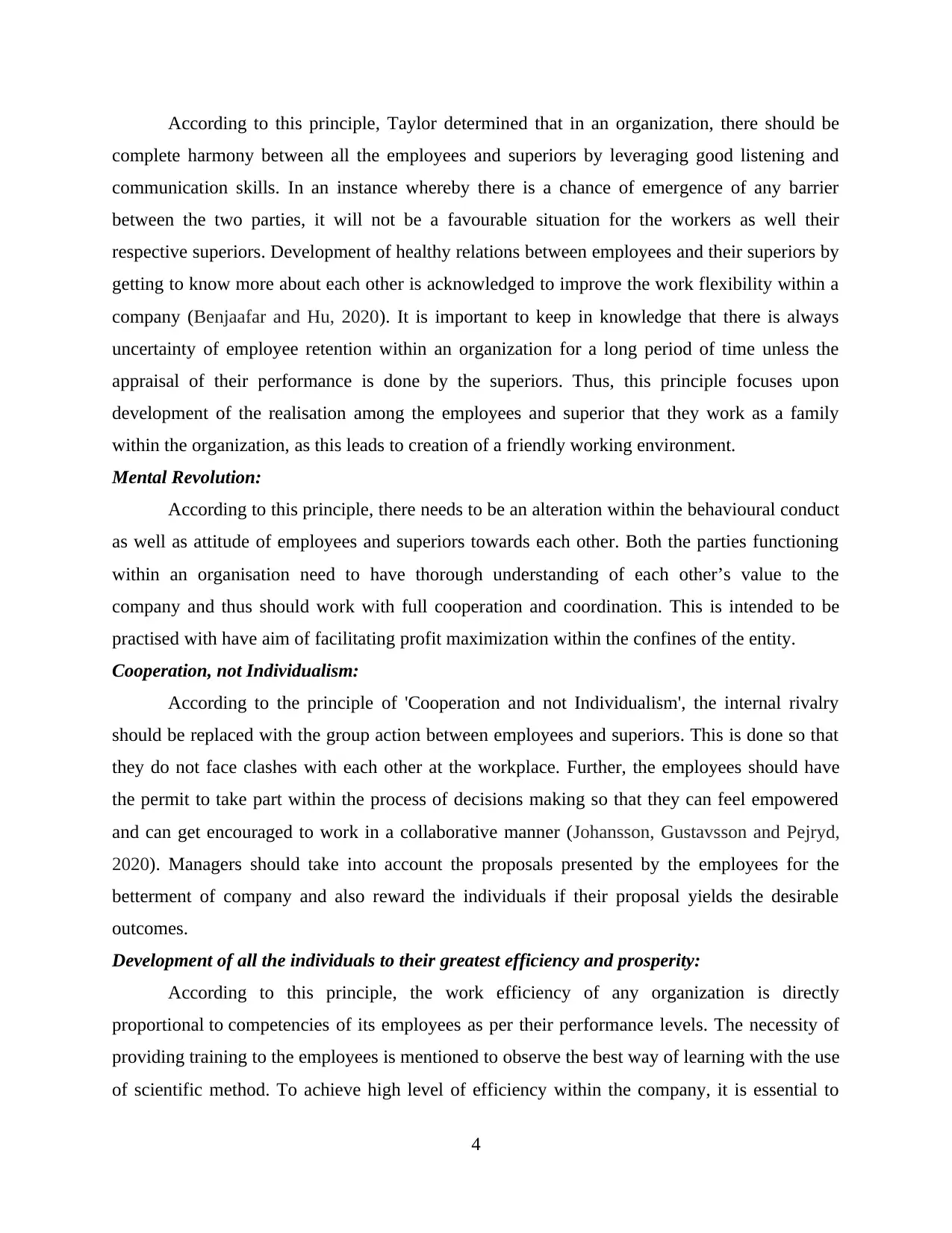
According to this principle, Taylor determined that in an organization, there should be
complete harmony between all the employees and superiors by leveraging good listening and
communication skills. In an instance whereby there is a chance of emergence of any barrier
between the two parties, it will not be a favourable situation for the workers as well their
respective superiors. Development of healthy relations between employees and their superiors by
getting to know more about each other is acknowledged to improve the work flexibility within a
company (Benjaafar and Hu, 2020). It is important to keep in knowledge that there is always
uncertainty of employee retention within an organization for a long period of time unless the
appraisal of their performance is done by the superiors. Thus, this principle focuses upon
development of the realisation among the employees and superior that they work as a family
within the organization, as this leads to creation of a friendly working environment.
Mental Revolution:
According to this principle, there needs to be an alteration within the behavioural conduct
as well as attitude of employees and superiors towards each other. Both the parties functioning
within an organisation need to have thorough understanding of each other’s value to the
company and thus should work with full cooperation and coordination. This is intended to be
practised with have aim of facilitating profit maximization within the confines of the entity.
Cooperation, not Individualism:
According to the principle of 'Cooperation and not Individualism', the internal rivalry
should be replaced with the group action between employees and superiors. This is done so that
they do not face clashes with each other at the workplace. Further, the employees should have
the permit to take part within the process of decisions making so that they can feel empowered
and can get encouraged to work in a collaborative manner (Johansson, Gustavsson and Pejryd,
2020). Managers should take into account the proposals presented by the employees for the
betterment of company and also reward the individuals if their proposal yields the desirable
outcomes.
Development of all the individuals to their greatest efficiency and prosperity:
According to this principle, the work efficiency of any organization is directly
proportional to competencies of its employees as per their performance levels. The necessity of
providing training to the employees is mentioned to observe the best way of learning with the use
of scientific method. To achieve high level of efficiency within the company, it is essential to
4
complete harmony between all the employees and superiors by leveraging good listening and
communication skills. In an instance whereby there is a chance of emergence of any barrier
between the two parties, it will not be a favourable situation for the workers as well their
respective superiors. Development of healthy relations between employees and their superiors by
getting to know more about each other is acknowledged to improve the work flexibility within a
company (Benjaafar and Hu, 2020). It is important to keep in knowledge that there is always
uncertainty of employee retention within an organization for a long period of time unless the
appraisal of their performance is done by the superiors. Thus, this principle focuses upon
development of the realisation among the employees and superior that they work as a family
within the organization, as this leads to creation of a friendly working environment.
Mental Revolution:
According to this principle, there needs to be an alteration within the behavioural conduct
as well as attitude of employees and superiors towards each other. Both the parties functioning
within an organisation need to have thorough understanding of each other’s value to the
company and thus should work with full cooperation and coordination. This is intended to be
practised with have aim of facilitating profit maximization within the confines of the entity.
Cooperation, not Individualism:
According to the principle of 'Cooperation and not Individualism', the internal rivalry
should be replaced with the group action between employees and superiors. This is done so that
they do not face clashes with each other at the workplace. Further, the employees should have
the permit to take part within the process of decisions making so that they can feel empowered
and can get encouraged to work in a collaborative manner (Johansson, Gustavsson and Pejryd,
2020). Managers should take into account the proposals presented by the employees for the
betterment of company and also reward the individuals if their proposal yields the desirable
outcomes.
Development of all the individuals to their greatest efficiency and prosperity:
According to this principle, the work efficiency of any organization is directly
proportional to competencies of its employees as per their performance levels. The necessity of
providing training to the employees is mentioned to observe the best way of learning with the use
of scientific method. To achieve high level of efficiency within the company, it is essential to
4
⊘ This is a preview!⊘
Do you want full access?
Subscribe today to unlock all pages.

Trusted by 1+ million students worldwide
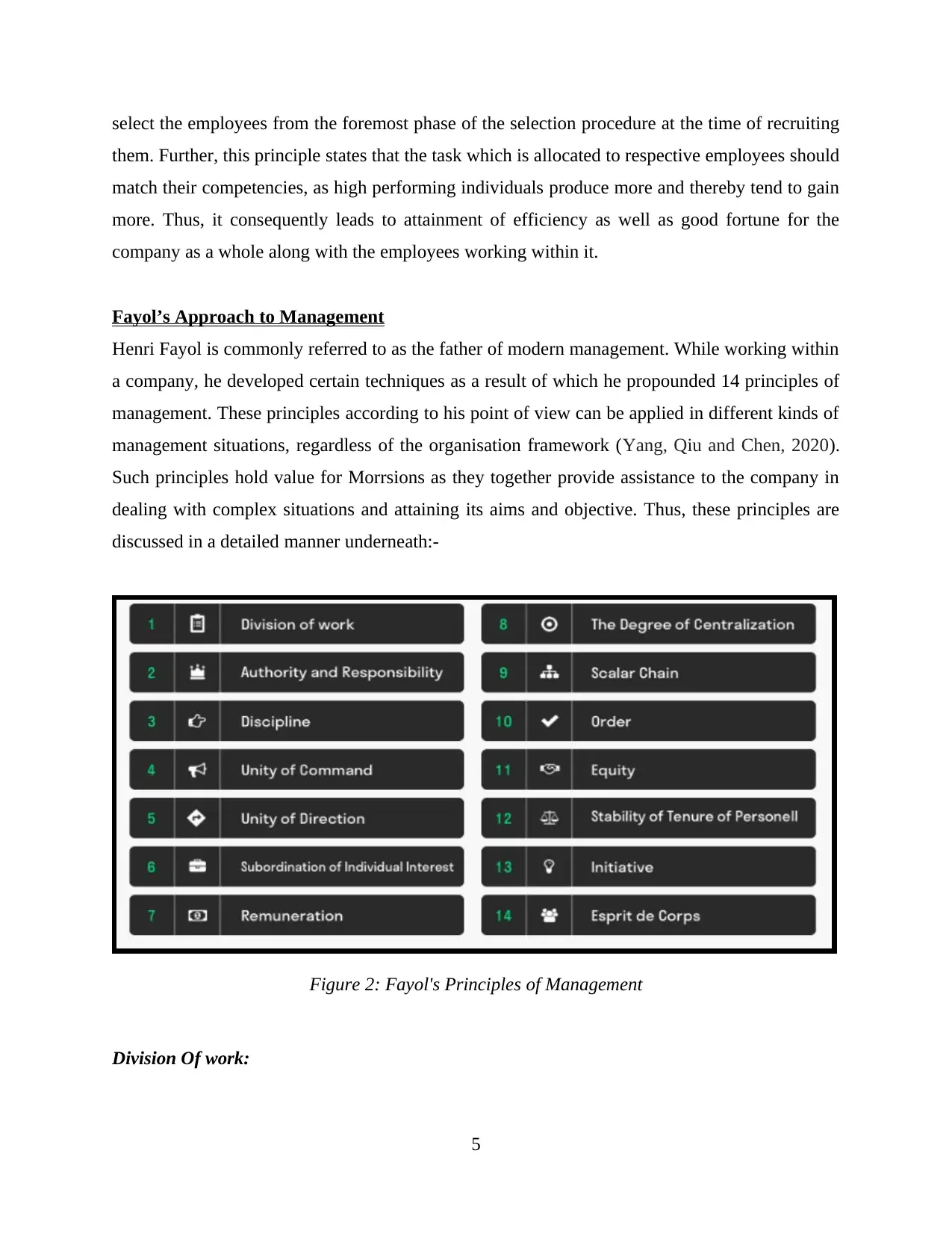
select the employees from the foremost phase of the selection procedure at the time of recruiting
them. Further, this principle states that the task which is allocated to respective employees should
match their competencies, as high performing individuals produce more and thereby tend to gain
more. Thus, it consequently leads to attainment of efficiency as well as good fortune for the
company as a whole along with the employees working within it.
Fayol’s Approach to Management
Henri Fayol is commonly referred to as the father of modern management. While working within
a company, he developed certain techniques as a result of which he propounded 14 principles of
management. These principles according to his point of view can be applied in different kinds of
management situations, regardless of the organisation framework (Yang, Qiu and Chen, 2020).
Such principles hold value for Morrsions as they together provide assistance to the company in
dealing with complex situations and attaining its aims and objective. Thus, these principles are
discussed in a detailed manner underneath:-
Figure 2: Fayol's Principles of Management
Division Of work:
5
them. Further, this principle states that the task which is allocated to respective employees should
match their competencies, as high performing individuals produce more and thereby tend to gain
more. Thus, it consequently leads to attainment of efficiency as well as good fortune for the
company as a whole along with the employees working within it.
Fayol’s Approach to Management
Henri Fayol is commonly referred to as the father of modern management. While working within
a company, he developed certain techniques as a result of which he propounded 14 principles of
management. These principles according to his point of view can be applied in different kinds of
management situations, regardless of the organisation framework (Yang, Qiu and Chen, 2020).
Such principles hold value for Morrsions as they together provide assistance to the company in
dealing with complex situations and attaining its aims and objective. Thus, these principles are
discussed in a detailed manner underneath:-
Figure 2: Fayol's Principles of Management
Division Of work:
5
Paraphrase This Document
Need a fresh take? Get an instant paraphrase of this document with our AI Paraphraser
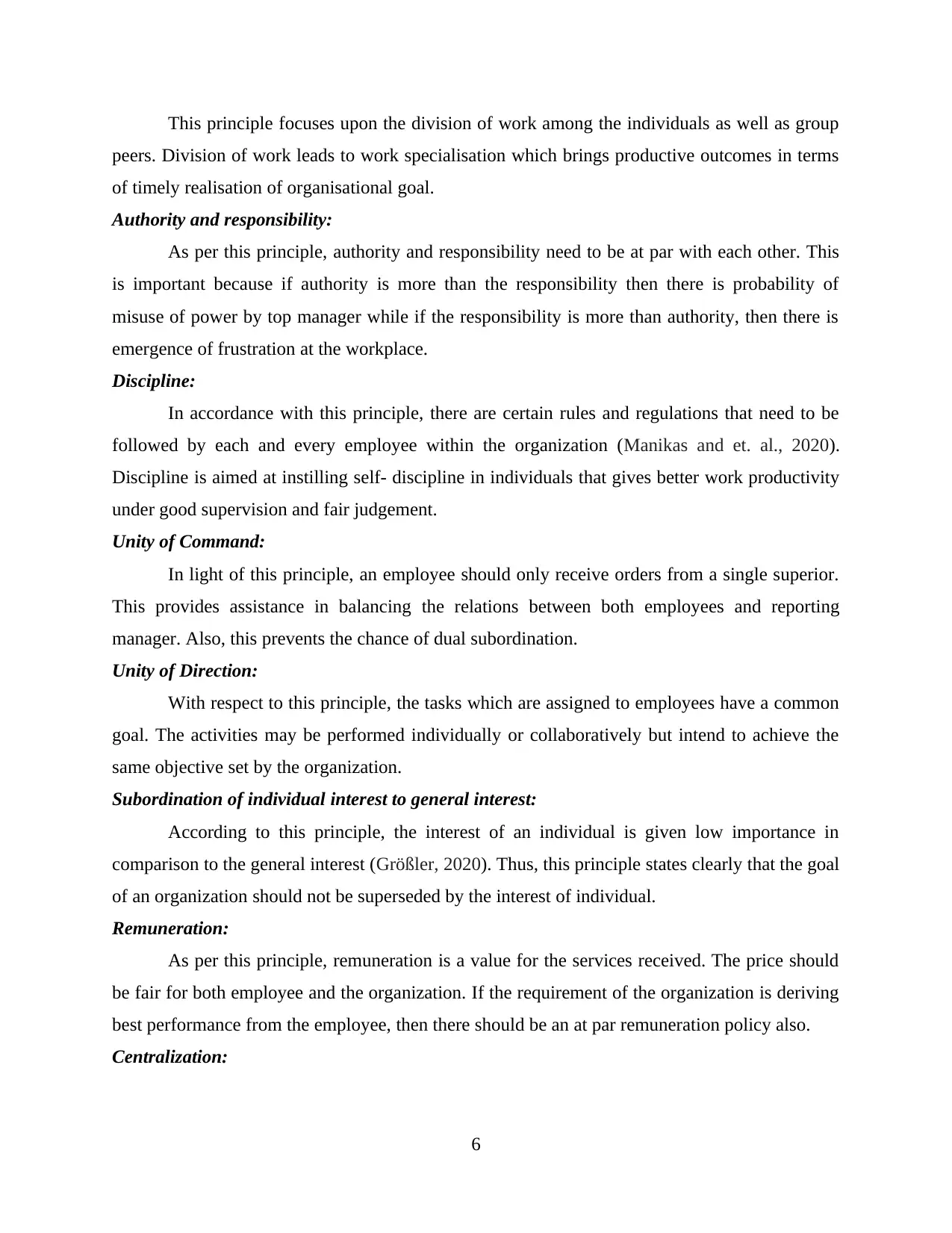
This principle focuses upon the division of work among the individuals as well as group
peers. Division of work leads to work specialisation which brings productive outcomes in terms
of timely realisation of organisational goal.
Authority and responsibility:
As per this principle, authority and responsibility need to be at par with each other. This
is important because if authority is more than the responsibility then there is probability of
misuse of power by top manager while if the responsibility is more than authority, then there is
emergence of frustration at the workplace.
Discipline:
In accordance with this principle, there are certain rules and regulations that need to be
followed by each and every employee within the organization (Manikas and et. al., 2020).
Discipline is aimed at instilling self- discipline in individuals that gives better work productivity
under good supervision and fair judgement.
Unity of Command:
In light of this principle, an employee should only receive orders from a single superior.
This provides assistance in balancing the relations between both employees and reporting
manager. Also, this prevents the chance of dual subordination.
Unity of Direction:
With respect to this principle, the tasks which are assigned to employees have a common
goal. The activities may be performed individually or collaboratively but intend to achieve the
same objective set by the organization.
Subordination of individual interest to general interest:
According to this principle, the interest of an individual is given low importance in
comparison to the general interest (Größler, 2020). Thus, this principle states clearly that the goal
of an organization should not be superseded by the interest of individual.
Remuneration:
As per this principle, remuneration is a value for the services received. The price should
be fair for both employee and the organization. If the requirement of the organization is deriving
best performance from the employee, then there should be an at par remuneration policy also.
Centralization:
6
peers. Division of work leads to work specialisation which brings productive outcomes in terms
of timely realisation of organisational goal.
Authority and responsibility:
As per this principle, authority and responsibility need to be at par with each other. This
is important because if authority is more than the responsibility then there is probability of
misuse of power by top manager while if the responsibility is more than authority, then there is
emergence of frustration at the workplace.
Discipline:
In accordance with this principle, there are certain rules and regulations that need to be
followed by each and every employee within the organization (Manikas and et. al., 2020).
Discipline is aimed at instilling self- discipline in individuals that gives better work productivity
under good supervision and fair judgement.
Unity of Command:
In light of this principle, an employee should only receive orders from a single superior.
This provides assistance in balancing the relations between both employees and reporting
manager. Also, this prevents the chance of dual subordination.
Unity of Direction:
With respect to this principle, the tasks which are assigned to employees have a common
goal. The activities may be performed individually or collaboratively but intend to achieve the
same objective set by the organization.
Subordination of individual interest to general interest:
According to this principle, the interest of an individual is given low importance in
comparison to the general interest (Größler, 2020). Thus, this principle states clearly that the goal
of an organization should not be superseded by the interest of individual.
Remuneration:
As per this principle, remuneration is a value for the services received. The price should
be fair for both employee and the organization. If the requirement of the organization is deriving
best performance from the employee, then there should be an at par remuneration policy also.
Centralization:
6
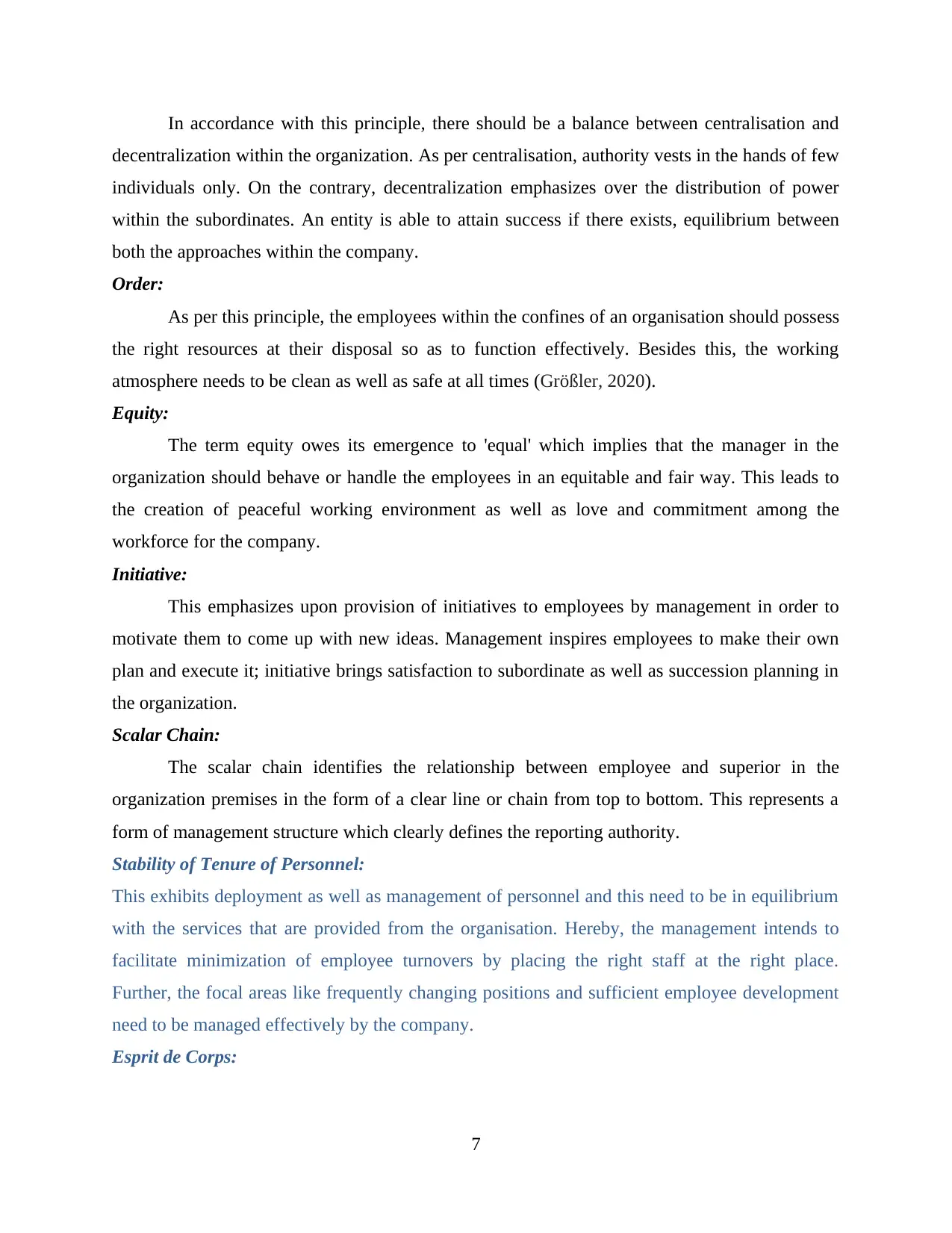
In accordance with this principle, there should be a balance between centralisation and
decentralization within the organization. As per centralisation, authority vests in the hands of few
individuals only. On the contrary, decentralization emphasizes over the distribution of power
within the subordinates. An entity is able to attain success if there exists, equilibrium between
both the approaches within the company.
Order:
As per this principle, the employees within the confines of an organisation should possess
the right resources at their disposal so as to function effectively. Besides this, the working
atmosphere needs to be clean as well as safe at all times (Größler, 2020).
Equity:
The term equity owes its emergence to 'equal' which implies that the manager in the
organization should behave or handle the employees in an equitable and fair way. This leads to
the creation of peaceful working environment as well as love and commitment among the
workforce for the company.
Initiative:
This emphasizes upon provision of initiatives to employees by management in order to
motivate them to come up with new ideas. Management inspires employees to make their own
plan and execute it; initiative brings satisfaction to subordinate as well as succession planning in
the organization.
Scalar Chain:
The scalar chain identifies the relationship between employee and superior in the
organization premises in the form of a clear line or chain from top to bottom. This represents a
form of management structure which clearly defines the reporting authority.
Stability of Tenure of Personnel:
This exhibits deployment as well as management of personnel and this need to be in equilibrium
with the services that are provided from the organisation. Hereby, the management intends to
facilitate minimization of employee turnovers by placing the right staff at the right place.
Further, the focal areas like frequently changing positions and sufficient employee development
need to be managed effectively by the company.
Esprit de Corps:
7
decentralization within the organization. As per centralisation, authority vests in the hands of few
individuals only. On the contrary, decentralization emphasizes over the distribution of power
within the subordinates. An entity is able to attain success if there exists, equilibrium between
both the approaches within the company.
Order:
As per this principle, the employees within the confines of an organisation should possess
the right resources at their disposal so as to function effectively. Besides this, the working
atmosphere needs to be clean as well as safe at all times (Größler, 2020).
Equity:
The term equity owes its emergence to 'equal' which implies that the manager in the
organization should behave or handle the employees in an equitable and fair way. This leads to
the creation of peaceful working environment as well as love and commitment among the
workforce for the company.
Initiative:
This emphasizes upon provision of initiatives to employees by management in order to
motivate them to come up with new ideas. Management inspires employees to make their own
plan and execute it; initiative brings satisfaction to subordinate as well as succession planning in
the organization.
Scalar Chain:
The scalar chain identifies the relationship between employee and superior in the
organization premises in the form of a clear line or chain from top to bottom. This represents a
form of management structure which clearly defines the reporting authority.
Stability of Tenure of Personnel:
This exhibits deployment as well as management of personnel and this need to be in equilibrium
with the services that are provided from the organisation. Hereby, the management intends to
facilitate minimization of employee turnovers by placing the right staff at the right place.
Further, the focal areas like frequently changing positions and sufficient employee development
need to be managed effectively by the company.
Esprit de Corps:
7
⊘ This is a preview!⊘
Do you want full access?
Subscribe today to unlock all pages.

Trusted by 1+ million students worldwide
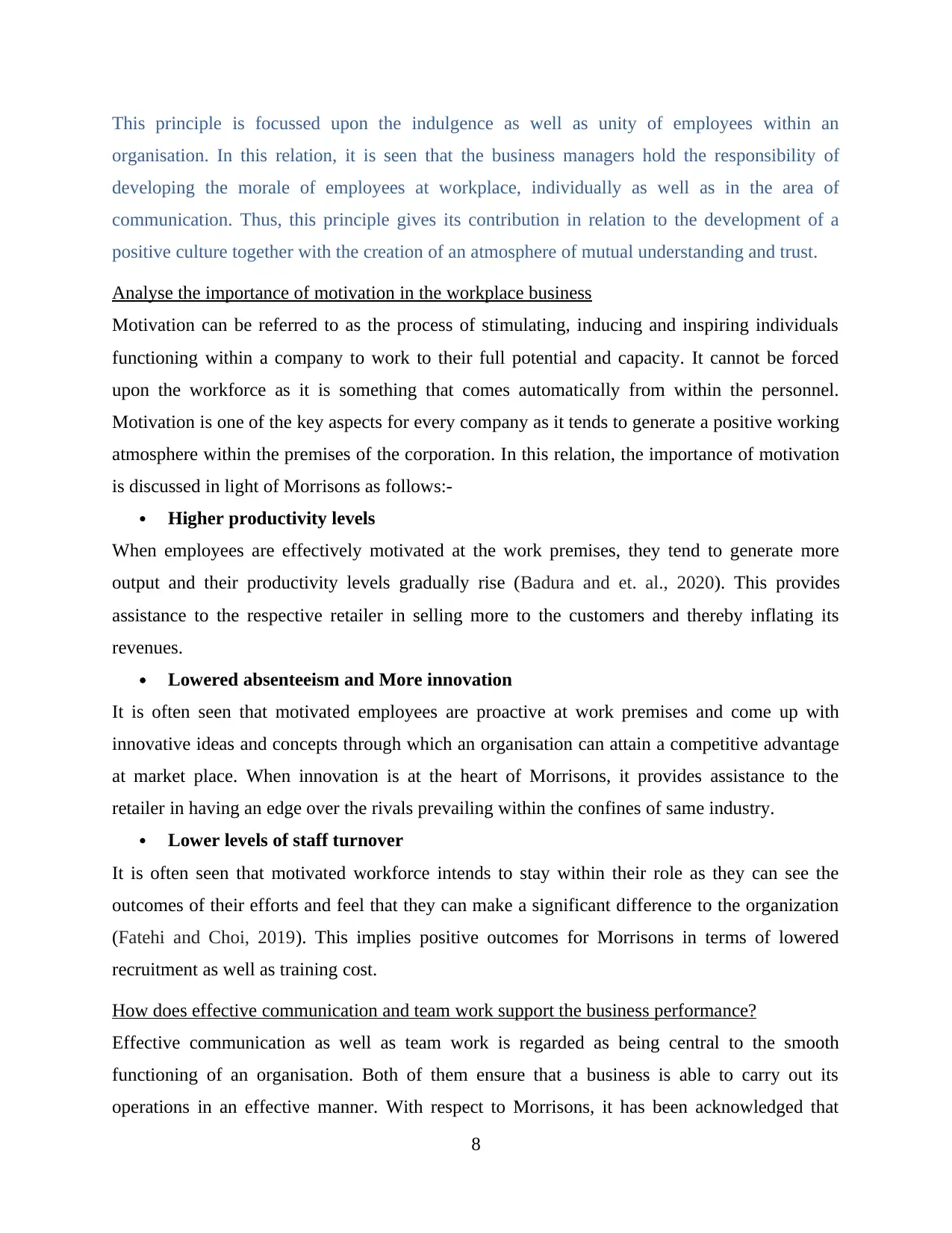
This principle is focussed upon the indulgence as well as unity of employees within an
organisation. In this relation, it is seen that the business managers hold the responsibility of
developing the morale of employees at workplace, individually as well as in the area of
communication. Thus, this principle gives its contribution in relation to the development of a
positive culture together with the creation of an atmosphere of mutual understanding and trust.
Analyse the importance of motivation in the workplace business
Motivation can be referred to as the process of stimulating, inducing and inspiring individuals
functioning within a company to work to their full potential and capacity. It cannot be forced
upon the workforce as it is something that comes automatically from within the personnel.
Motivation is one of the key aspects for every company as it tends to generate a positive working
atmosphere within the premises of the corporation. In this relation, the importance of motivation
is discussed in light of Morrisons as follows:-
Higher productivity levels
When employees are effectively motivated at the work premises, they tend to generate more
output and their productivity levels gradually rise (Badura and et. al., 2020). This provides
assistance to the respective retailer in selling more to the customers and thereby inflating its
revenues.
Lowered absenteeism and More innovation
It is often seen that motivated employees are proactive at work premises and come up with
innovative ideas and concepts through which an organisation can attain a competitive advantage
at market place. When innovation is at the heart of Morrisons, it provides assistance to the
retailer in having an edge over the rivals prevailing within the confines of same industry.
Lower levels of staff turnover
It is often seen that motivated workforce intends to stay within their role as they can see the
outcomes of their efforts and feel that they can make a significant difference to the organization
(Fatehi and Choi, 2019). This implies positive outcomes for Morrisons in terms of lowered
recruitment as well as training cost.
How does effective communication and team work support the business performance?
Effective communication as well as team work is regarded as being central to the smooth
functioning of an organisation. Both of them ensure that a business is able to carry out its
operations in an effective manner. With respect to Morrisons, it has been acknowledged that
8
organisation. In this relation, it is seen that the business managers hold the responsibility of
developing the morale of employees at workplace, individually as well as in the area of
communication. Thus, this principle gives its contribution in relation to the development of a
positive culture together with the creation of an atmosphere of mutual understanding and trust.
Analyse the importance of motivation in the workplace business
Motivation can be referred to as the process of stimulating, inducing and inspiring individuals
functioning within a company to work to their full potential and capacity. It cannot be forced
upon the workforce as it is something that comes automatically from within the personnel.
Motivation is one of the key aspects for every company as it tends to generate a positive working
atmosphere within the premises of the corporation. In this relation, the importance of motivation
is discussed in light of Morrisons as follows:-
Higher productivity levels
When employees are effectively motivated at the work premises, they tend to generate more
output and their productivity levels gradually rise (Badura and et. al., 2020). This provides
assistance to the respective retailer in selling more to the customers and thereby inflating its
revenues.
Lowered absenteeism and More innovation
It is often seen that motivated employees are proactive at work premises and come up with
innovative ideas and concepts through which an organisation can attain a competitive advantage
at market place. When innovation is at the heart of Morrisons, it provides assistance to the
retailer in having an edge over the rivals prevailing within the confines of same industry.
Lower levels of staff turnover
It is often seen that motivated workforce intends to stay within their role as they can see the
outcomes of their efforts and feel that they can make a significant difference to the organization
(Fatehi and Choi, 2019). This implies positive outcomes for Morrisons in terms of lowered
recruitment as well as training cost.
How does effective communication and team work support the business performance?
Effective communication as well as team work is regarded as being central to the smooth
functioning of an organisation. Both of them ensure that a business is able to carry out its
operations in an effective manner. With respect to Morrisons, it has been acknowledged that
8
Paraphrase This Document
Need a fresh take? Get an instant paraphrase of this document with our AI Paraphraser
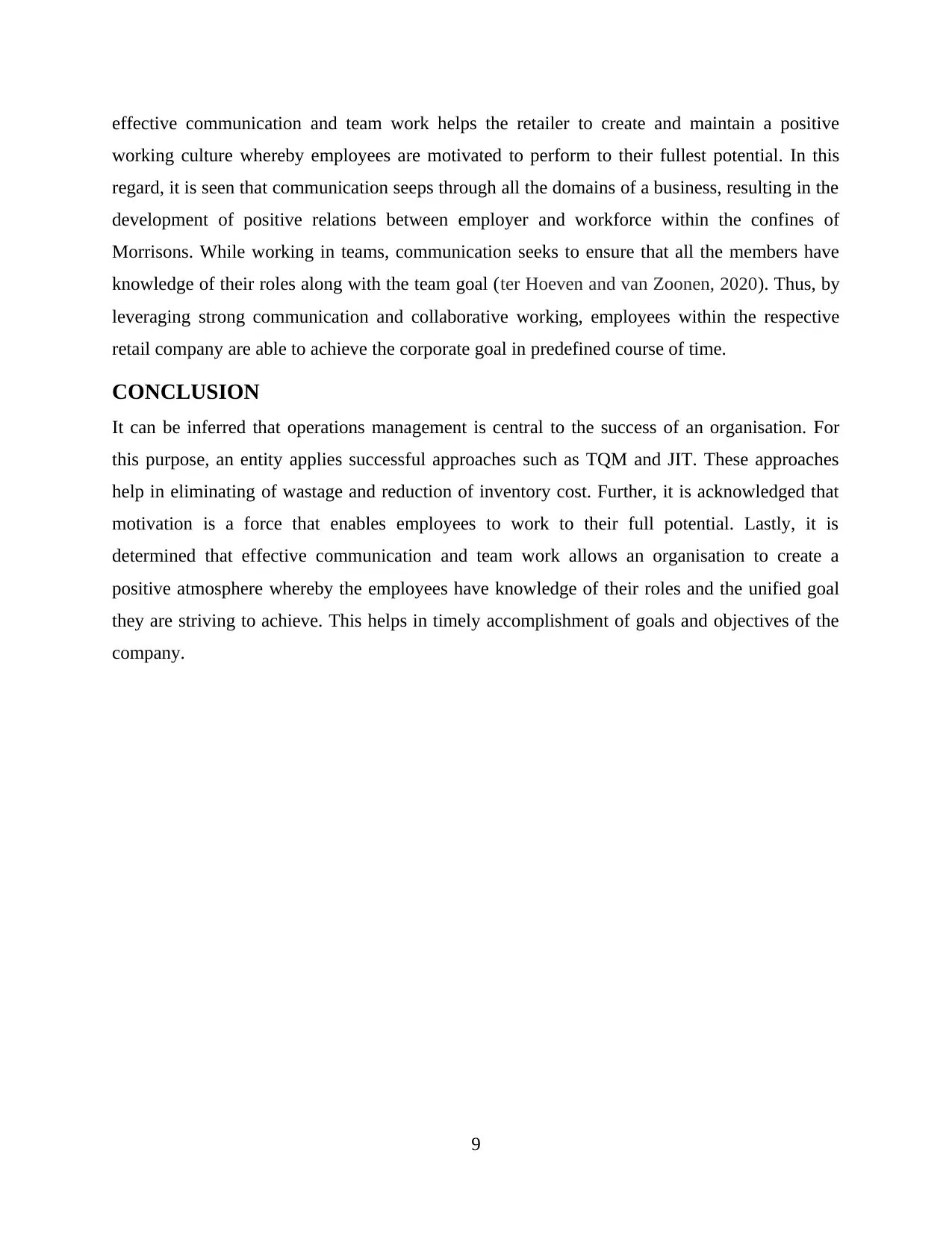
effective communication and team work helps the retailer to create and maintain a positive
working culture whereby employees are motivated to perform to their fullest potential. In this
regard, it is seen that communication seeps through all the domains of a business, resulting in the
development of positive relations between employer and workforce within the confines of
Morrisons. While working in teams, communication seeks to ensure that all the members have
knowledge of their roles along with the team goal (ter Hoeven and van Zoonen, 2020). Thus, by
leveraging strong communication and collaborative working, employees within the respective
retail company are able to achieve the corporate goal in predefined course of time.
CONCLUSION
It can be inferred that operations management is central to the success of an organisation. For
this purpose, an entity applies successful approaches such as TQM and JIT. These approaches
help in eliminating of wastage and reduction of inventory cost. Further, it is acknowledged that
motivation is a force that enables employees to work to their full potential. Lastly, it is
determined that effective communication and team work allows an organisation to create a
positive atmosphere whereby the employees have knowledge of their roles and the unified goal
they are striving to achieve. This helps in timely accomplishment of goals and objectives of the
company.
9
working culture whereby employees are motivated to perform to their fullest potential. In this
regard, it is seen that communication seeps through all the domains of a business, resulting in the
development of positive relations between employer and workforce within the confines of
Morrisons. While working in teams, communication seeks to ensure that all the members have
knowledge of their roles along with the team goal (ter Hoeven and van Zoonen, 2020). Thus, by
leveraging strong communication and collaborative working, employees within the respective
retail company are able to achieve the corporate goal in predefined course of time.
CONCLUSION
It can be inferred that operations management is central to the success of an organisation. For
this purpose, an entity applies successful approaches such as TQM and JIT. These approaches
help in eliminating of wastage and reduction of inventory cost. Further, it is acknowledged that
motivation is a force that enables employees to work to their full potential. Lastly, it is
determined that effective communication and team work allows an organisation to create a
positive atmosphere whereby the employees have knowledge of their roles and the unified goal
they are striving to achieve. This helps in timely accomplishment of goals and objectives of the
company.
9
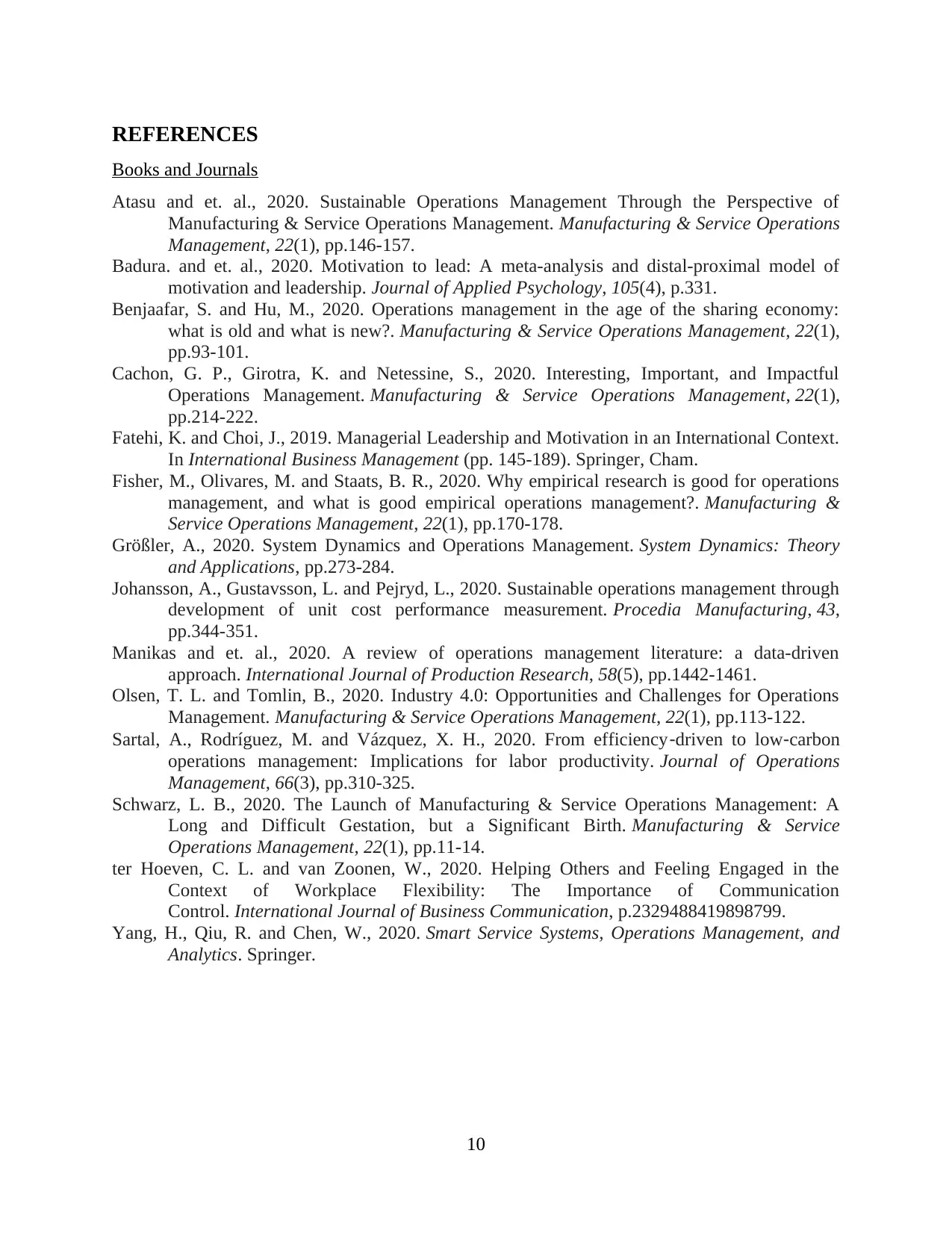
REFERENCES
Books and Journals
Atasu and et. al., 2020. Sustainable Operations Management Through the Perspective of
Manufacturing & Service Operations Management. Manufacturing & Service Operations
Management, 22(1), pp.146-157.
Badura. and et. al., 2020. Motivation to lead: A meta-analysis and distal-proximal model of
motivation and leadership. Journal of Applied Psychology, 105(4), p.331.
Benjaafar, S. and Hu, M., 2020. Operations management in the age of the sharing economy:
what is old and what is new?. Manufacturing & Service Operations Management, 22(1),
pp.93-101.
Cachon, G. P., Girotra, K. and Netessine, S., 2020. Interesting, Important, and Impactful
Operations Management. Manufacturing & Service Operations Management, 22(1),
pp.214-222.
Fatehi, K. and Choi, J., 2019. Managerial Leadership and Motivation in an International Context.
In International Business Management (pp. 145-189). Springer, Cham.
Fisher, M., Olivares, M. and Staats, B. R., 2020. Why empirical research is good for operations
management, and what is good empirical operations management?. Manufacturing &
Service Operations Management, 22(1), pp.170-178.
Größler, A., 2020. System Dynamics and Operations Management. System Dynamics: Theory
and Applications, pp.273-284.
Johansson, A., Gustavsson, L. and Pejryd, L., 2020. Sustainable operations management through
development of unit cost performance measurement. Procedia Manufacturing, 43,
pp.344-351.
Manikas and et. al., 2020. A review of operations management literature: a data-driven
approach. International Journal of Production Research, 58(5), pp.1442-1461.
Olsen, T. L. and Tomlin, B., 2020. Industry 4.0: Opportunities and Challenges for Operations
Management. Manufacturing & Service Operations Management, 22(1), pp.113-122.
Sartal, A., Rodríguez, M. and Vázquez, X. H., 2020. From efficiency‐driven to low‐carbon
operations management: Implications for labor productivity. Journal of Operations
Management, 66(3), pp.310-325.
Schwarz, L. B., 2020. The Launch of Manufacturing & Service Operations Management: A
Long and Difficult Gestation, but a Significant Birth. Manufacturing & Service
Operations Management, 22(1), pp.11-14.
ter Hoeven, C. L. and van Zoonen, W., 2020. Helping Others and Feeling Engaged in the
Context of Workplace Flexibility: The Importance of Communication
Control. International Journal of Business Communication, p.2329488419898799.
Yang, H., Qiu, R. and Chen, W., 2020. Smart Service Systems, Operations Management, and
Analytics. Springer.
10
Books and Journals
Atasu and et. al., 2020. Sustainable Operations Management Through the Perspective of
Manufacturing & Service Operations Management. Manufacturing & Service Operations
Management, 22(1), pp.146-157.
Badura. and et. al., 2020. Motivation to lead: A meta-analysis and distal-proximal model of
motivation and leadership. Journal of Applied Psychology, 105(4), p.331.
Benjaafar, S. and Hu, M., 2020. Operations management in the age of the sharing economy:
what is old and what is new?. Manufacturing & Service Operations Management, 22(1),
pp.93-101.
Cachon, G. P., Girotra, K. and Netessine, S., 2020. Interesting, Important, and Impactful
Operations Management. Manufacturing & Service Operations Management, 22(1),
pp.214-222.
Fatehi, K. and Choi, J., 2019. Managerial Leadership and Motivation in an International Context.
In International Business Management (pp. 145-189). Springer, Cham.
Fisher, M., Olivares, M. and Staats, B. R., 2020. Why empirical research is good for operations
management, and what is good empirical operations management?. Manufacturing &
Service Operations Management, 22(1), pp.170-178.
Größler, A., 2020. System Dynamics and Operations Management. System Dynamics: Theory
and Applications, pp.273-284.
Johansson, A., Gustavsson, L. and Pejryd, L., 2020. Sustainable operations management through
development of unit cost performance measurement. Procedia Manufacturing, 43,
pp.344-351.
Manikas and et. al., 2020. A review of operations management literature: a data-driven
approach. International Journal of Production Research, 58(5), pp.1442-1461.
Olsen, T. L. and Tomlin, B., 2020. Industry 4.0: Opportunities and Challenges for Operations
Management. Manufacturing & Service Operations Management, 22(1), pp.113-122.
Sartal, A., Rodríguez, M. and Vázquez, X. H., 2020. From efficiency‐driven to low‐carbon
operations management: Implications for labor productivity. Journal of Operations
Management, 66(3), pp.310-325.
Schwarz, L. B., 2020. The Launch of Manufacturing & Service Operations Management: A
Long and Difficult Gestation, but a Significant Birth. Manufacturing & Service
Operations Management, 22(1), pp.11-14.
ter Hoeven, C. L. and van Zoonen, W., 2020. Helping Others and Feeling Engaged in the
Context of Workplace Flexibility: The Importance of Communication
Control. International Journal of Business Communication, p.2329488419898799.
Yang, H., Qiu, R. and Chen, W., 2020. Smart Service Systems, Operations Management, and
Analytics. Springer.
10
⊘ This is a preview!⊘
Do you want full access?
Subscribe today to unlock all pages.

Trusted by 1+ million students worldwide
1 out of 12
Related Documents
Your All-in-One AI-Powered Toolkit for Academic Success.
+13062052269
info@desklib.com
Available 24*7 on WhatsApp / Email
![[object Object]](/_next/static/media/star-bottom.7253800d.svg)
Unlock your academic potential
Copyright © 2020–2025 A2Z Services. All Rights Reserved. Developed and managed by ZUCOL.





